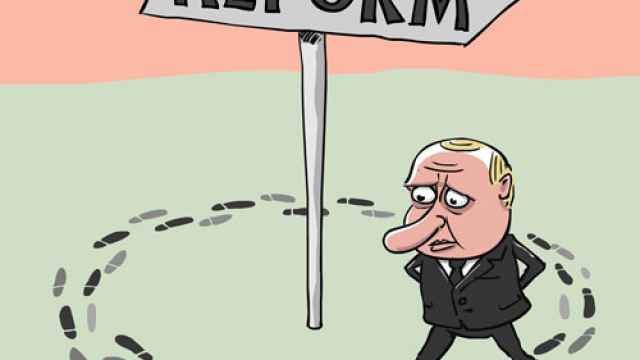Russian officials claim that this country will not suffer no matter how the situation is resolved in Greece. Whether that optimistic prediction is accurate will soon become evident, but even now, two important things are quite clear. Russia sees the Greek crisis as an opportunity to participate in the resolution of European problems, and also as a way to postpone uncomfortable discussions concerning Ukraine and Crimea.
However, it might prove much more useful to look at Greece as if looking in a mirror: The lessons of what happens to a country in collapse might have far greater import for Russia than whatever chance it might provide to give a boost to Moscow's international reputation.
Early this week, Kremlin spokesman Dmitry Peskov mentioned several times that President Vladimir Putin had spoken by telephone with Greek Prime Minister Alexis Tsipras and other senior Western European politicians. That created the impression that Russia was participating in the resolution of the Greek crisis.
The chronological order of the announcements made it appear that the Russian president is working with the Greek prime minister as a strategic partner representing Greece's interests to its creditors.
Although this gives ample support to the conspiracy theory that Putin's regime cunningly supported Syriza in the Greek elections in a deliberate plan to push the country toward a predictable impasse and force the European Union to cope with a possible Greek exit from the euro zone, Putin is acknowledged as a skilled manipulator and no doubt saw the opportunity to divert attention away from the Ukrainian conflict and Crimea and toward something closer and more troubling for Europe.
By acting as a friendly participant in negotiations over Greece, Moscow can restart a positive working dialogue with Europeans that is devoid of the inevitable emotions associated with Ukrainian affairs. It also plays well to a domestic audience. After all, at different times in its history, Russians have viewed Greece as their spiritual ancestral home and the cradle of Orthodox Christianity, or else as a "protectorate" Orthodox country.
To the Russian mind, the Turkish Straits linking the Black Sea to the Mediterranean should rightfully have been named the Greek Straits, as it was called before the fall of Byzantium. The Russian Empire cherished the goal of gaining control over those straits throughout much of the 18th and 19th centuries.
For many years, Russian propaganda has sought to make a palatable "cocktail" from Russians' images of their beloved but otherwise incompatible imperial and Soviet pasts. The Kremlin's decision to protect the interests of Greece — as it did during the golden days of the Russian Empire — dovetails nicely with that propaganda.
Another useful ingredient that Kremlin spin doctors sometimes toss into that cocktail is the occasional comment by Greek politicians, intellectuals and ordinary citizens who claim that the real problem is not with Greece's corruption, debt and the senseless populism of the country's left-wing government, but the long-standing opposition of the Catholic West to the Orthodox East.
Each such statement reinforces Russia's propaganda campaign and gives confidence to Russian politicians who believe that they are locked in a chess game with the West. They see it as a contest in which Crimea, Ukraine and a number of other important post-Soviet countries, companies and individuals are just so many chess pieces on the notorious chessboard first described by former U.S. National Security Adviser Zbigniew Brzezinski.
They see the Greek crisis as, if not the result of a combination of moves aimed at undermining the enemy's position, then at least a chance and unfavorable circumstance for Europe that it would be a sin for Moscow not to exploit.
Of course, the problem with viewing the world as a global chessboard is that it always underestimates the "gray areas" — the subtle but ever-increasing degree of interdependence between states that even such broad gestures as the imposition of mutual sanctions cannot eliminate.
Russians have long known that when government officials and Kremlin-friendly analysts begin telling them that everything will be fine, that means it is time to prepare for the worst — and the situation with Greece is no exception.
The hostility to the West that now characterizes mainstream television is also found among many of the very same Russians who convert their ruble salaries into euros as a hedge against inflation and fluctuations in the exchange rate. Although most Russians still lack much knowledge of economics, they do understand that if the euro were to lose value, it would affect everyone — even those who have never held a euro in their hands.
This understanding is one part of global interdependence. It remains a question as to whether that understanding is now stronger than the customary dislike of everything "alien" that the authorities sometimes even inculcate, but the trend is clear. Russians might follow the lead of commentators on state-controlled television and rail against fascism and gays in Europe, but few if any of them would agree to prove their patriotism by changing their euros back into rubles.
It is not far from that to the next straightforward conclusion — that it is best not to gloat over events in Greece and delight in Russia's revenge against that treacherous EU. Greece — which simply ran out of money this week — offers Russians a chance to see what might happen to their own country if it loses in the isolationist game it is playing with the West.
Despite all the obvious differences in the situations in Russia and Greece, the two do share something in common.
For example, both have incompetent and corrupt government bureaucracies. Both have populations hopelessly habituated to receiving money, not earning it.
In Russia, that is seen from the sweeping promises for social spending that Putin made in his election campaign in 2012.
Those social obligations are, on the one hand, a holdover from a Soviet economy that was never fully restructured, a burden that is sometimes mistakenly seen as the inherent problem of a modern welfare state. On the other hand, in pure, Greek-style populism, leaders curry votes with promises of spending that now they see are impossible to implement.
Russia is definitely bigger, richer and stronger than Greece. But oddly enough, Russia is in some ways worse off than that small Mediterranean country of olive trees, beaches and crystal clear water.
When the global situation is stable, that liability seems more like an asset: Russian institutions are much less tied to Europe or other external powers than those of Greece. What's more, Russia backs up its proud sovereignty with not only an army, but also a massive arsenal of nuclear weapons.
The question is: How might that asset become a liability — not only for this country, but for the entire world — if, like Greece, Russia one day simply runs out of money?
Ivan Sukhov is a journalist who has covered conflicts in Russia and the CIS for the past 15 years.
A Message from The Moscow Times:
Dear readers,
We are facing unprecedented challenges. Russia's Prosecutor General's Office has designated The Moscow Times as an "undesirable" organization, criminalizing our work and putting our staff at risk of prosecution. This follows our earlier unjust labeling as a "foreign agent."
These actions are direct attempts to silence independent journalism in Russia. The authorities claim our work "discredits the decisions of the Russian leadership." We see things differently: we strive to provide accurate, unbiased reporting on Russia.
We, the journalists of The Moscow Times, refuse to be silenced. But to continue our work, we need your help.
Your support, no matter how small, makes a world of difference. If you can, please support us monthly starting from just $2. It's quick to set up, and every contribution makes a significant impact.
By supporting The Moscow Times, you're defending open, independent journalism in the face of repression. Thank you for standing with us.
Remind me later.






